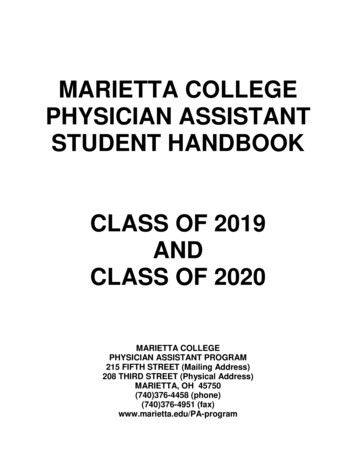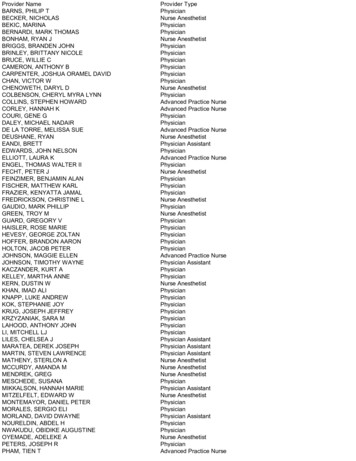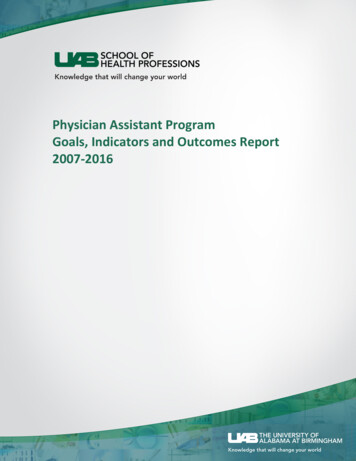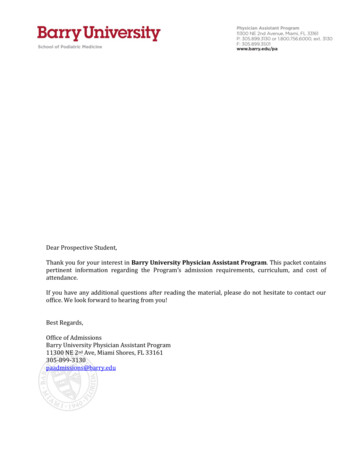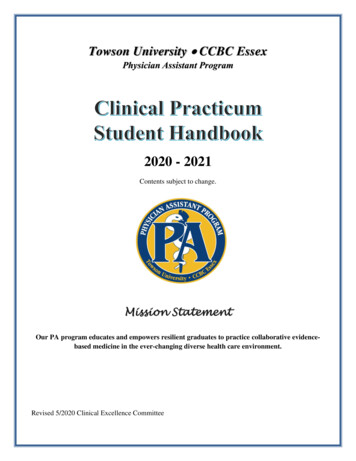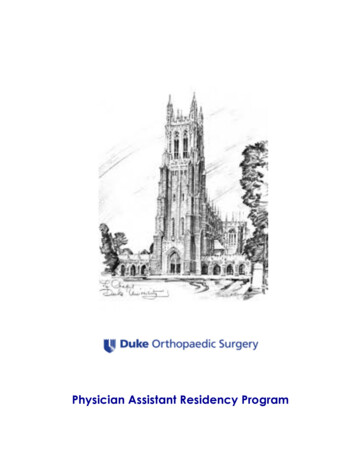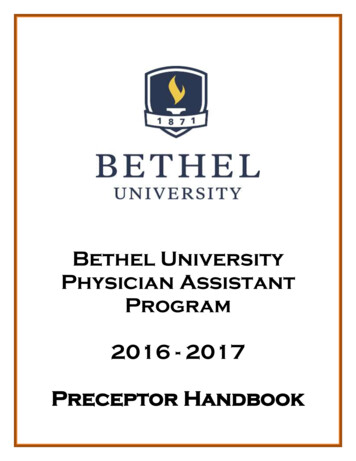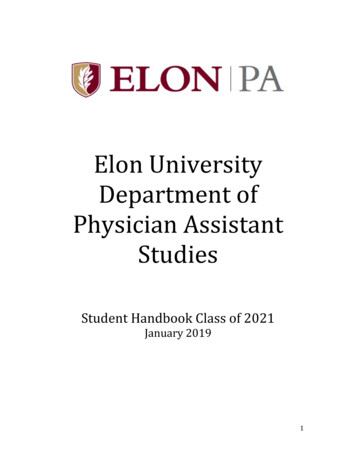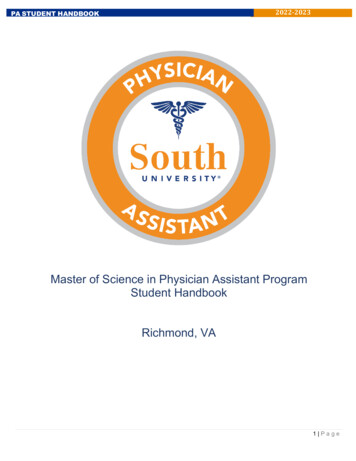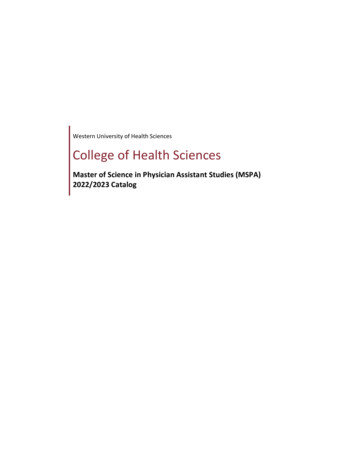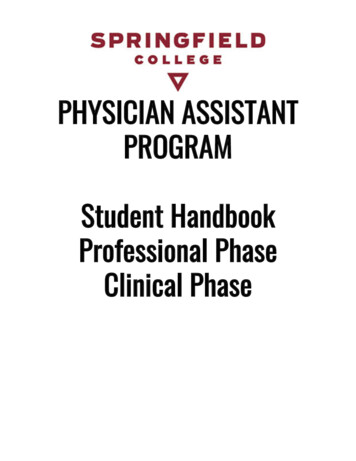
Transcription
PHYSICIAN ASSISTANTPROGRAMStudent HandbookProfessional PhaseClinical Phase
Revised: April 20211
Table of ContentsINTRODUCTION AND WELCOME4Introduction4Welcome4MISSION, GOALS, AND OBJECTIVES5Mission5Goals5GENERAL ADMINISTRATIVE POLICIES8ACADEMIC POLICIES AND PROFESSIONALISM9PA Program Curriculum9Attendance10Leave of Absence (LOA)10Grading System11Learning Disabilities11Credit Transfer12Harassment Policy12Testing Policy12MINIMUM TECHNICAL STANDARDS FOR ADMISSION, CONTINUATION, AND GRADUATION13ACADEMIC HONESTY15WRITING POLICY16PROFESSIONAL CONDUCT, ETHICS, AND ATTIRE EXPECTED OF STUDENTS IN THE PROGRAM16STANDARDS OF PROFESSIONALISM17USE OF DRUGS OR ALCOHOL BY STUDENTS17HEALTH STATUS, BACKGROUND CHECK, AND DRUG SCREEN REQUIREMENTS18REQUIREMENTS FOR SUCCESSFUL COMPLETION OF THE DIDACTIC YEAR AND MATRICULATION TO THE CLINICAL YEAR18REQUIREMENTS FOR SUCCESSFUL COMPLETION OF THE CLINICAL YEAR19EVALUATION OF PROFESSIONAL CONDUCT19EVALUATION OF ACADEMIC PERFORMANCE20ACCIDENT/INCIDENT REPORT21STUDENT HEALTH21EQUIPMENT212
MEDICAL REFERENCE RESOURCES22PROFESSIONAL ORGANIZATIONS22PHYSICIAN ASSISTANT PROGRAM23FACULTY AND STAFF23ADJUNCT FACULTY23APPENDIX A24STUDENT SELF-EVALUATION OF PROFESSIONALISMAPPENDIX B2425SPRINGFIELD COLLEGE PHYSICIAN ASSISTANT PROGRAM APPEAL PROCEDUREAPPENDIX C2526SPRINGFIELD COLLEGE PHYSICIAN ASSISTANT PROGRAM ACCIDENT/INCIDENT REPORTING FORMAPPENDIX D2627SPRINGFIELD COLLEGE PHYSICIAN ASSISTANT PROGRAM ETHICAL CODE OF BEHAVIOR FOR PHYSICIAN ASSISTANTSAPPENDIX E2729SPRINGFIELD COLLEGE PHYSICIAN ASSISTANT PROGRAM PERFORMANCE COMPETENCIESAPPENDIX F2932SPRINGFIELD COLLEGE PHYSICIAN ASSISTANT PROGRAM EXPOSURE POLICY AND PROTOCOLAPPENDIX G3233SPRINGFIELD COLLEGE PHYSICIAN ASSISTANT PROGRAM BLOODBORNE PATHOGENS EXPOSURE REPORTAPPENDIX H3337SPRINGFIELD COLLEGE PA PROGRAM COMPETENCIESEntrustable Professional Activities and Logging Requirements3737Entrustable Professional Activities37Competency Evaluation Process40Patient Encounter Log Minimums40Direct Observation of Procedural Skills (DOPS)41Springfield College Physician Assistant Program Yearly Patient Encounter Minimum Competencies423
SPRINGFIELD COLLEGEPHYSICIAN ASSISTANT PROGRAMI. INTRODUCTION AND WELCOMEA. IntroductionThe Physician Assistant Program Student Handbook contains information on the policies, procedures, regulations,requirements, and standards required for successful completion of the Springfield College Physician Assistant Program. It isa supplement to the Springfield College Student Handbook and the Undergraduate and Graduate Catalogs.The Physician Assistant Program reserves the right to make changes in the rules and regulations of the program, itsacademic calendar, admission policies, procedures and standards, degree requirements, and standards necessary forsuccessful completion of the program at its sole discretion. Additionally, change may include, but is not limited to, changesin course content, scheduling of courses offered, and canceling of scheduled classes and/or other program relatedactivities.The College reserves the right to make changes in admission requirements, fees, charges, tuition, instructors, policies,procedures, standards, regulations, and academic programs offered at its sole discretion. Additionally, the College has theright to divide, cancel, or reschedule classes or programs if enrollment or other factors require such action.B. WelcomeWelcome to the Springfield College (SC) Physician Assistant (PA) Program. This program provides a strenuous but rewardingeducational experience. Faculty and staff of the program will work with you to help you attain the goal of certification toattempt to become a physician assistant. The Springfield College Physician Assistant Program is accredited by theAccreditation Review Commission on Education for the Physician Assistant (ARC-PA).The Accreditation Review Commission on Education for the Physician Assistant has granted Accreditation-Continued statusto the Springfield College Physician Assistant Program sponsored by Springfield College. Accreditation-Continued is anaccreditation status granted when a currently accredited program is in compliance with the ARC-PA Standards.Accreditation remains in effect until the program closes or withdraws from the accreditation process or until accreditationis withdrawn for failure to comply with the Standards. The approximate date for the next validation review of the programby the ARC-PA will be September 2026. The review date is contingent upon continued compliance with the AccreditationStandards and ARC-PA policy.4
II. MISSION, GOALS, AND OBJECTIVESA.MissionThe mission of the SC Physician Assistant Program is to educate students in spirit, mind, and body for leadership inclinical, community, and academic service to humanity by building upon its foundations of humanics and academicexcellence.B.Goals1. Goal 1: ProfessionalismProvide educational experiences which help to instill and promote the development of professionalvalues, ethical behaviors, and leadership to humanity that are expected of physician assistants.a)Objectives(1) Exhibit an understanding of diverse populations, medical ethics, patient confidentiality,professional values, and responsibilities. (PAST 540)(2) Pursue observational experiences in a clinical setting under the supervision of aphysician assistant. (PAST 522/532)(3) Continue to apply critical thinking skills and principles of medical ethics in all aspects ofclinical and professional tasks and behaviors. (PAST 640/650/660/670-680)(4) Demonstrate professional behavior. (PAST 640/650/660/670-680)(5) Discuss, via professional presentation, a medical case that the student has seen duringone of the clinical clerkships each semester. (PAST 640/650/660)b) Outcomes(1) Our students excel in the areas of professionalism, ethical behavior, and service tohumanity. The college sponsors a campus-wide humanics in action day that many of ourstudents attend. The PA student organization (PASO) runs a bone marrow drive andorganizes a 5K-road race to support a community charity.(2) Every semester each student completes a professionalism self-assessment, which isreviewed with his or her advisor and documented in his or her student file. Anydeficiencies identified by either the student or faculty member are discussed, and a planfor remediation is developed.(3) Clinical students of our program have consistently and successfully demonstratedexcellence in the areas of professionalism and ethical behavior as reported by ourclinical preceptors. Based on clinical preceptor surveys and student evaluations ourstudents scoreCultural Competence92.6%Conduct and Demeanor93.2%Dependability and Responsibility 92.3%Professional Relationships93.2%5
2. Goal 2: Evidence Based PracticeEducate students as to the importance of continued, evidence-based practice through understanding,evaluating, and utilizing medical literature for life-long learning.a) Objectives(1) Discriminate between high- and low-quality articles in the health care literature. (RSCH610/612/PAST 626)(2) Interpret the literature for application in their field. (RSCH 610/612/PAST 626)(3) Understand the elements and components of research and research reports. (RSCH610/612/PAST 626)(4) Detect the various sources of bias in health care related articles and materials. (RSCH610/612/PAST 626)(5) Describe the phases of clinical research for drugs and investigational devices. (RSCH610/612/PAST 626)(6) Demonstrate the ability to discuss articles using research terminology. (RSCH610/612/PAST 626)b) Outcomes(1) All of our students undergo curriculum-wide training in evidence-based practice. Theireducation starts with a foundation and methods of research and a statistics course. Thestudents conduct literature reviews and use their training to demonstrate the ability tocollect, analyze, and draw conclusions from the medical literature. The capstone projectis a best-practices paper and poster based upon their literature review, which may bepresented at a professional conference. Throughout the entire curriculum, evidencebased assignments are used to reinforce the students' learning.3. Goal 3: Interprofessional/ Disciplinary EducationProvide educational experiences, which support the practice of patient-centered care by preparing ourstudents to work effectively in interprofessional health care teams.a)Objectives(1) Identify the roles and responsibilities of various health care professionals and how theseprofessionals contribute to the team approach of patient-centered health care as part ofan interprofessional team. (PAST 540)(2) Develop the ability to express opinions and professional judgments to team members.(PAST 534/544/670-680)(3) Listen respectfully to other team members and participate both as a team leader andmember. (PAST 534/544/670-680)(4) Understand and respect the roles, responsibilities, and expertise of all participants.(PAST 534/544/670-680)(5) Engage with other health professionals in collaborative, patient-centered problemsolving. (PAST 544/670-680)(6) Understand your own and others’ stereotypical views of different health professionsand professionals. (PAST 534/544/670-680)6
b) Outcomes(1) All students attend and participate in an interprofessional experience during the didacticyear. The students then write a reflection paper based on their experience.(2) Based on clinical preceptor surveys and student evaluations, our students scoreCommunication with preceptor, clinical staff and other team members 93.2%Patient-centered care92.3%4. Goal 4: Medical Knowledge and Patient CareEducate physician assistants who have the clinical skills necessary to provide high-quality medical care in avariety of clinical settings.a)Objectives(1) Perform the appropriate history and physical exam throughout the lifespan. (PAST512/522/532/670-680)(2) Counsel and educate patients on preventative care and chronic and acute diseaseprocesses. (PAST 512/522/532/670-680)(3) Discuss the anatomy and physiology of each disease process. (PAST 515/525/670-680)(4) Discuss the appropriate utilization of pharmacotherapeutics in acute and chronicconditions. (PAST 523/533/543/670-680)(5) Discuss mental health disorders, diagnosis, treatment, and appropriate referral.(PAST513/670-680)(6) Perform various clinical skills used commonly in clinical practice. (PAST 521/531/670680)(7) Discuss the epidemiology, etiology, pathophysiology, risk factors, signs/symptoms,differential diagnosis, physical findings, diagnostics, and treatment plans for variousdisease states. (PAST 524/534/544/670-680)(8) Identify and interpret the appropriate diagnostic and laboratory medicine for eachdisease. (PAST 524/534/544/670-680)(9) Integrate the knowledge base and skills learned during the didactic year to enhance andfurther learning during clinical experiences to provide the best patient care to diversepopulations. (PAST 640/650/660/670-680)b) Outcomes(1) Springfield College PA students excel at medical knowledge and patient care goals asevidenced by our Physician Assistant National Certifying Exam (PANCE) pass ratesposted on the webpage.(2) Our students consistently score above average on the PANCE task areas when comparedto the national mean.7
(3) Average patient-care scores on the PANCE for the most recent graduating classcompared to national averages:Springfield College PANCENational PANCEApplying Scientific Concepts81% 80%Clinical Intervention82% 79%Formulating Most likely diagnosis83% 81%Health Maintenance76% 77%History and Physical Exam82% 80%Pharmaceutical Therapeutics82% 77%Lab and Diagnostics Studies82% 80%III. GENERAL ADMINISTRATIVE POLICIESA. Students must provide a local address, email, home telephone number, and cell phone number to the PhysicianAssistant Program office each year. Changes in address or telephone number should be given to the programadministrative associate and updated when necessary.B. Each student is required to purchase malpractice insurance each year that he or she is enrolled in the professionalphase of the program. This insurance is linked to tuition payment. Therefore, non-payment of tuition will result inlack of malpractice insurance, which will prevent students from engaging in history taking and physicalexamination exercises with classmates and patient encounters in the didactic year or clinical rotations.C. Students are only covered by the College’s liability insurance while registered for and attending each officiallyassigned clinical rotation or shadowing experience. For each rotation or assignment, the student must besupervised by (and will be evaluated by) the designated clinical preceptor and is only covered for activities that areacademically required and within the scope of practice for the clinical preceptor. Students must obtain permissionfrom the clinical education director or program director prior to attending any shadowing or clinical time otherthan their officially assigned clinical rotations or shadowing experiences. If engaging in an activity not covered bythe College’s liability insurance, students may be provided with liability insurance by their clinical preceptor oraffiliated institution or may purchase their own insurance if desired.D. Students are expected to secure their own transportation (reliable car) to clinical sites and didactic lectures.E. Physician assistant students are expected to follow all rules, regulations, policies, and procedures outlined in theSpringfield College Student Handbook, Physician Assistant Program Student Handbooks, and the SpringfieldCollege Graduate Catalog.F. Students are not required to perform administrative or clerical duties for the program or while on clinical rotation.A clinical student will not be used in substitution for a regular clinical or administrative staff member.G. Most of the clinical rotation experiences in the clinical year will require travel to sites outside the Springfield area,greater than 1 hour away. Students are responsible for all costs associated with these clinical rotations, includingtravel, parking, and living expenses. Students are also responsible for the costs associated with uniforms anddiagnostic equipment.H. Because of the intensity of the physician assistant program, students are strongly discouraged from attempting towork outside of the program. Students should bear in mind that any work undertaken outside the program is notcovered by the student malpractice insurance required during the professional phase of the program. Course workand clinical experiences will not be arranged to accommodate any outside work.8
I.Principal faculty, the program director, and the medical director will not participate as health care providers forstudents in the program.J.PA students must not have access to the academic records or other confidential information of other students orfaculty.K. Student health records are confidential and will be kept at the Health Center and will not be accessible to orreviewed by the program, principal or instructional faculty, or staff except for immunization, drug testing, andtuberculosis screening results, which may be maintained and released with written permission from the student.IV. ACADEMIC POLICIES AND PROFESSIONALISMThe cornerstone of PA education is a combination of academic success and professional development. Various steps are inplace to monitor the performance and promotion of physician assistant students. The promotions committee follows eachstudent to ensure academic and professional development or to take action when inadequacies are found. Any deficienciesfound in a student’s performance are discussed within the committee, and recommendations regarding remediation ordismissal are made. Continued enrollment in the Springfield College Physician Assistant program is subject to the decisionof the promotions committee, the program director, and the dean, who must be assured that academic grades and overallperformance are satisfactory, that the student is complying with policies of the Springfield College Physician AssistantProgram, and that the best interests of the School and of the other students are being served through the student’scontinued enrollment.A.PA Program CurriculumDidactic PhaseYear 1 SpringRSCH 610RSCH 620PAST 540BIOL 376PAST 515Research MethodsEducational and Psychological Statistics IProfessional IssuesMedical GeneticsHuman Anatomy Laboratory IYear 1 SummerPAST 512PAST 524PAST 513PAST 523RSCH 612History and Physical IClinical Medicine IMental Health IssuesPharmacology IProposal DesignYear 1 FallPAST 522PAST 525PAST 514PAST 534PAST 533PAST 512History and Physical IIHuman Anatomy Lab IIPrinciples of Clinical Decision MakingClinical Medicine IIPharmacology IIApplied Clinical Skills IIYear 2 SpringPAST 532PAST 544PAST 531EMSM251History and Physical IIIClinical Medicine IIIApplied Clinical Skills IIAdvanced Cardiac Life Support9
Clinical PhaseYear 2 SummerPAST 670PAST 671PAST 672PAST 640RSCH 626Inpatient Medicine IInpatient Medicine IIFamily Medicine IPA Seminar VIIIPA Research ProjectYear 2 FallPAST 673PAST 674PAST 675PAST 676PAST 650Family Medicine IIEmergency MedicineObstetrics and GynecologyPediatricsPA Seminar IXYear 3 SpringPAST 677PAST 678PAST 679PAST 680PAST 660PsychiatryGeneral SurgeryPreceptorship IPreceptorship IIPA Seminar XNote that the order/semester of the Clinical Phase courses will change depending on availabilityof the clinical sites.B.Attendance1. Punctual classroom attendance in all program courses is mandatory. A student who arrives late or leavesearly will be considered absent unless granted permission by the course instructor or course coordinator.Excessive absences from class or clinical rotations may result in a reduction in grade or failure of thecourse. Please consult the individual course syllabus for instructions and policies regarding make-up,absence, and lateness.2. It is required that each student attend all clinical assignments and rotations at the scheduled time. Ifpersonal illness or emergency prevents the student from attending the clinical site, the clinical preceptorand the clinical education director must be notified prior to the student's scheduled arrival time.3. Students who encounter difficulty in maintaining a professional commitment to their clinical training oracademic studies, must meet with the program director to discuss continuation in the program. In orderfor a student who has missed classes to remain in the program, all missed work, to the degree possible,must be made up by the end of the course. It is the student's responsibility to make up missed work. Ifwork cannot be made up by the end of the course, the student may receive a reduction in grade, failure,or an incomplete as determined by the course instructor or course coordinator. This may lead todeceleration in or dismissal from the program.C.Leave of Absence (LOA)A request for LOA must be submitted in writing to the promotions committee, who will make a recommendationto the program director. The final decision will be made by the program director. LOA may be granted, if deemedappropriate, for health, personal, or family reasons. A leave of absence is generally granted for a period of 1 year,with readmission into a subsequent class, at the discretion of the program director. Readmission will be allowed10
provided the issues necessitating the leave have been dealt with appropriately. If for any reason the LOA extendsbeyond 1 year, the student must apply for readmission to the program, unless a longer period is approved by theprogram director. Each student is only allowed 1 lifetime LOA.1. In order to be considered for a leave of absence, the following conditions must exist:a)Minimum grade of B in all physician assistant program courses at the time of the request.b) If requesting a leave of absence during an academic semester, the student must be in PAprogram academic good standing (have an average of a B in all classes in progress).c)Demonstrated behavior, attitude, and ethics consistent with the professional demeanorexpected of a physician assistant student as determined by the program director.d) Course work must not be greater than 80% completed (in accordance with College policy).2. All students requesting a leave of absence musta)Request the LOA in a letter specifying both the LOA start and return to school dates,b) Meet with the program director,c)Receive a letter from the program director approving the leave, andd) Meet with the dean of students for an official LOA from Springfield College.D.Grading SystemUnless otherwise stipulated by the individual course syllabus, the grading system followed by the PhysicianAssistant Program for program courses is as follows:94 - 100A4.090 - 93A-3.786 - 89B 3.380 - 85B3.0 Satisfactory Performance Unsatisfactory Performance E.77 – 79B-2.775 – 76C 2.373 – 74C2.070 – 72C-1.7 70F0Learning DisabilitiesSeveral different teaching methods may be used in program courses. Regardless of the method(s) used, it is thestudent's responsibility to learn the material. Anyone with a documented learning disability recognized by theCollege who wishes accommodations should identify him or herself to the Academic Success Center within the firstweek of classes to see whether reasonable accommodations are appropriate and/or available.11
F.Credit TransferStudents will not be excused from taking any courses in the Physician Assistant Program. All courses must be takenat Springfield College. No course substitutions are allowed.G.Harassment PolicySee the Springfield College Student Handbook for the Harassment Policy. The program will defer to the Collegepolicy when dealing with cases of harassment which may be found at https://springfield.edu/studenthandbook.H.Testing Policy1. Exam BlocksExams are administered in a single or in multiple blocks of test questions. A student may answer thequestions within a block in any order, and the student may review and change responses within a block ofquestions during the time allotted for that section. However, after the student exits a block of testquestions, or after time expires for that block, the student will not be allowed to review its questions orchange answers.2. Exam LengthExam length can vary and include multiple blocks of no more than 60 questions with 60 minutes tocomplete each block. There will be 5 minutes allotted for breaks between blocks, and the student will beresponsible for managing break time.3. Personal Belongingsa)No personal belongings (ie, brimmed hats, backpacks, handbags, books, notes, study materials,calculators, watches of any kind, electronic paging devices, recording or filming devices, radios,cellular phones, outerwear, or food and beverages) are allowed in the testing room except in thefront of the exam room. Upon reasonable suspicion, personal belongings and their contents maybe subject to inspection. Any materials that are, or reasonably appear to be, a reproduction ofany Springfield College PA examination materials will be confiscated.b) Exam dividers will be used during all exams and the instructor will assign students seats.c)Student cell phones and watches will be placed in airplane mode and stored on the desk in frontof the exam dividers in full view of the exam proctor.d) While taking a scheduled or unscheduled break, you may not access personal items that havebeen stored in the front of the room, including any electronic devices.e) While on an unscheduled break, you are not allowed to access any personal items other thanmedication or food required at a specific time, with the prior approval of the exam proctor. Itemsnot permitted include, but are not limited to, cell phones, PDAs, computers, Blackberries ,watches, exam notes, books or study guides, or other electronic devices.f)If you use medical devices or equipment that you must have with you at all times, please be sureto have your accommodations documented prior to the exam.4. Breaksa)There is a total of 5 minutes allotted for scheduled breaks between testing blocks. Aftercompletion of each block, the scheduled break will begin, and the student will not be able toreturn to the block of questions available prior the break. Any scheduled break time used overthe 5-minute break time will be deducted from the remaining exam time and may result in yourexamination closing earlier than anticipated.12
b) If a student takes a break during a block of questions, it will be considered an unscheduled break.The amount of unscheduled break time taken will be deducted from the time allotted to answerquestions.c)While on an unscheduled break, the student is not allowed to access any personal items otherthan medication or food required at a specific time, with the prior approval of the instructor.Items not permitted include, but are not limited to, cell phones, PDAs, computers, Blackberries ,watches, exam notes, books or study guides, or other electronic devices.d) While on an unscheduled break, if a student leaves and reenters the exam room, the studentmust sign out, noting the exact time of exit, and the student will be required to sign back inlisting the exact time of return.e) Students are responsible for managing their break time. The successive test block will begin atthe scheduled time, and the test will time out and close at the end of the last 60-minute block.f)While taking a scheduled break, students are not permitted to access personal items that havebeen stored in the front of the exam room, except food or medicine.g)If a student finishes a test question block prior to the scheduled 60-minute block and closes theblock in a multiple test block exam, the student may take the optional scheduled break orrequest the password for the next block; the student will not have access to any personalbelongings during that time. If the student elects to take the scheduled break, the student willneed to sign out, noting the exit time, and sign back, noting the return time, upon return. Oncethe student finishes the final test question block and closes the test, the student should leave theclassroom.5. CheatingIf any student is found to be not following the aforementioned exam protocol, the student will be given ascore of zero (0) for the exam and possibly dismissed from the program.V. MINIMUM TECHNICAL STANDARDS FORADMISSION, CONTINUATION, AND GRADUATIONIn addition to the academic standards described above, students will be expected to meet the following minimum technicalstandards in order to successfully complete the program. Technical standards define the attributes that are considerednecessary for students to possess in order to complete their education and training and subsequently enter clinical practice.These standards are prerequisites for entrance, continuation, and graduation from the Springfield College PhysicianAssistant Program. Students must possess aptitude, ability, and skills in 5 areas: observation; communication; sensory andmotor coordination and function; conceptualization, integration, and quantitation; and behavioral and social attributes.The functions as described below are critically important to the student and must be autonomously performed by thestudent. It should be understood that these are standards for minimum competence in the program.A. OBSERVATION1. Students must be able to observe demonstrations and conduct experiments in the basic sciencesincluding, but not limited to, chemical, biological, anatomic and physiologic sciences, microbiologiccultures, and microscopic studies of microorganisms. Students must be able to observe intracellulardetails through a microscope and observe demonstrations in the classroom including films, projectedoverheads and slides, or other forms of visual presentation.13
2. Students must be able to accurately observe a patient near and at a distance, noting nonverbal as well asverbal signs. Specific vision-related criteria include, but are not limited to, detecting and identifyingchanges in color of fluids, skin, culture media, visualizing and discriminating findings on x-rays and otherimaging tests, and reading written and illustrated materials. Students must be able to observe anddifferentiate changes in body movement, observe anatomic structures, discriminate among numbers andpatterns associated with diagnostic tests such as electrocardiograms and electroencephalograms, andcompetently use diagnostic instruments such as an otoscope, ophthalmoscope, and microscope.B. COMMUNICATION1. Students must be able to effectively relate to patients, conveying a sense of compassion and empathy.They must be able to clearly communicate with patients in order to elicit information; accurately describechanges in mood, activity, and posture of patients; and understand verbal as well as nonverbalcommunication.2. Communication includes not only speech, but reading and writing. Physician assistant education presentsexceptional challenges in the volume and breadth of required reading in order to master the subject areaand to impart information to others. Students must be able to communicate quickly, effectively, andefficiently in oral and hand-written and typed English in the classroom and later, with all members of thehealth care team. Specific requirements include, but are not limited to, the following: rapidly and clearlycommunicating with the medical team on rounds or elsewhere, eliciting an accurate history and physicalexam from patients, and communicating complex findings in appropriate terms to patients and to variousmembers of the health care team. Students must learn to recognize and promptly respond to emotionalcommunications such as sadness and agitation.3. Students must be able to read and write efficiently, accurately, and legibly to record observations andplans in legal documents such as the patient record. Students must be able to prepare and communicateconcise but complete summaries of individual encounters and c
to the Springfield College Physician Assistant Program sponsored by Springfield College. Accreditation-Continued is an . Springfield College PA students excel at medical knowledge and patient care goals as evidenced by our Physician Assistant National Certifying Exam (PANCE) pass rates posted on the webpage.
